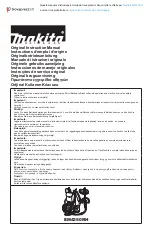
8
GENERAL SAFETY RULES
Your ELECTRIC TRIMMER has many features that
will make your job faster and easier. Safety, per-
formance and reliability have been given top
priority in the design of this tool, qualities to
make easy to maintain and to operate.
WARNING: Read and understand all instruc-
tions. Failure to follow all indications listed be-
low, may result in electric shock, fire and/or seri-
ous personal injury.
SAVE THESE INSTRUCTIONS.
SAFETY IN WORKING AREA
Keep your work area clean and well lit. Clut-
tered benches and dark areas may cause acci-
dents.
Do not operate power tools in explosive atmo-
spheres, such as in the presence of flammable
liquids, gases or dust. Some power tools create
sparks which may provoke fire.
Keep away observers, children and visitors
while operating a power tool. Distractions can
cause you to lose control.
ELECTRIC SAFETY
Double insulation eliminates the need for the
three wire grounded power cord and grounded
power supply system.
Avoid the body contact with grounded surfaces
such as pipes, radiators and refrigerators. There
is an increased risk of electric shock if your body
is grounded.
Don’t expose power tools to rain or wet condi-
tions. The presence of water into power tools
will increase the risk of electric shock.
Do not abuse of the power cord. Never use the
power cord to carry the tool and do not pull
the plug off the outlet. Keep the cable away of
heat, oil, sharp edges or moving parts. Replace
damaged cords immediately. Damaged cords in-
crease the risk of electric shock.
When operating a power tool outside, use an
outdoor extension cord marked “W-A” or “W”.
These cords are rated for outdoor use and re-
duce the risk of electric shock.
EXTENSION CORDS
Replace damaged cords immediately. The use
of damaged cords can shock, burn or electric
shock. If an extension cord is necessary, a cord
with adequate size conductors should be used
to prevent excessive voltage drop, loss of power
or overheating. The table below shows the cor-
rect size to use, depending on cord length and
nameplate amperage rating of tools. In case of
doubt use the next heavier gauge. Always use
UL listed extension cords.
SIZE RECOMMEND EXTENSION CABLES
PERSONAL SAFETY
Stay alert, watch what you are doing and use
common sense when operating a power tool.
Don’t use the tool if you are tired or under the
influence of drugs, alcohol or medication. A
moment of inattention while operating power
tools may cause a serious personal injury.
Dress properly. Do not wear loose clothing or
jewelry. Contain long hair. Keep your hair, cloth-
ing and gloves away of moving parts. Loose
clothes, jewelry or long hair can be caught in
moving parts.
Avoid an accidental starting. Be sure that the
switch is OFF before plugging in. Carrying tools
with the finger on the switch or plug in the tool
switch in ON may cause accidents.
Remove the adjusting keys or wrenches before
turning the tool on. A wrench or a key that is
left close to a rotating part of the tool may pro-
voke a personal injury.
Do not overreach. Keep proper footing and bal-
ance at all times. Proper footing and balance
enables better control of the tools on unexpect-
ed situations.
Use safety equipment. Always wear eye protec-
tion. Dust mask, nonskid safety shoes, hard hat,
or hearing protection must be used for appro-
priate conditions.
Before connecting the tool to a power source
(receptacle, outlet, etc.) be sure that the voltage
supplied is the same as that one specified on
the nameplate of the tool. To use a not specified
voltage may cause a serious injury to the user as
well as damage the tool.
IMPORTANT: This appliance is not intended
for use by persons (including children) with re-
duced physical, sensory or mental capabilities
may be different or reduced, or lack of experi-
ence or knowledge, unless such persons are su-






























